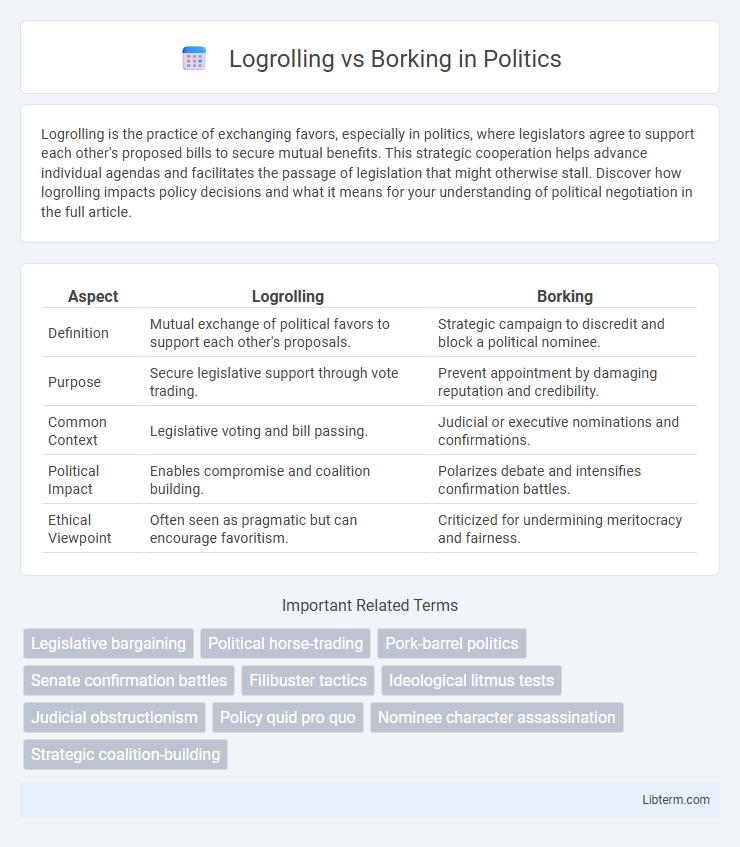Logrolling is the practice of exchanging favors, especially in politics, where legislators agree to support each other's proposed bills to secure mutual benefits. This strategic cooperation helps advance individual agendas and facilitates the passage of legislation that might otherwise stall. Discover how logrolling impacts policy decisions and what it means for your understanding of political negotiation in the full article.
Table of Comparison
| Aspect | Logrolling | Borking |
|---|---|---|
| Definition | Mutual exchange of political favors to support each other's proposals. | Strategic campaign to discredit and block a political nominee. |
| Purpose | Secure legislative support through vote trading. | Prevent appointment by damaging reputation and credibility. |
| Common Context | Legislative voting and bill passing. | Judicial or executive nominations and confirmations. |
| Political Impact | Enables compromise and coalition building. | Polarizes debate and intensifies confirmation battles. |
| Ethical Viewpoint | Often seen as pragmatic but can encourage favoritism. | Criticized for undermining meritocracy and fairness. |
Overview of Logrolling and Borking
Logrolling is a legislative strategy where lawmakers exchange support for each other's proposals to secure mutual benefits, often enabling the passage of bills that might not succeed independently. Borking refers to the aggressive opposition tactic aimed at discrediting or blocking a nominee, particularly judicial appointments, through negative campaigning and public scrutiny. Both practices influence political decision-making but differ in approach: logrolling fosters cooperation among legislators, while borking centers on partisan obstruction.
Definitions: Logrolling vs Borking
Logrolling is a legislative practice where lawmakers exchange support for each other's proposed bills to secure mutual passage, often involving reciprocal voting agreements. Borking refers to the concerted effort to obstruct a political nominee, especially a judicial appointment, through aggressive public criticism and opposition campaigns aimed at damaging the nominee's reputation. Both terms describe strategic political tactics but differ fundamentally in context and application, with logrolling emphasizing transactional cooperation and borking centered on adversarial opposition.
Historical Origins of Logrolling
Logrolling originated in 18th-century American politics as a strategy where legislators exchanged support for each other's projects to secure mutual benefits. This practice emerged from early congressional negotiations, reflecting the coalition-building necessary in a fragmented legislature. Unlike Borking, which involves intense opposition to judicial nominees, logrolling emphasizes cooperative vote trading to advance legislative agendas.
The Birth and Evolution of Borking
The concept of Borking emerged prominently in American politics during the 1980s, named after Supreme Court nominee Robert Bork, whose controversial rejection highlighted the tactic of aggressive character assassination. Unlike logrolling, which involves reciprocal legislative support, Borking focuses on mobilizing public and political opposition to derail a nomination or proposal through intensive media campaigns and negative framing. Over time, Borking has evolved into a strategic tool for partisanship, emphasizing ideological purity and public perception to influence judicial and political appointments.
Key Differences Between Logrolling and Borking
Logrolling involves mutual support where legislators exchange favors to pass each other's proposals, emphasizing cooperation and negotiation in legislative processes. Borking targets nomination processes by mobilizing opposition campaigns to discredit and defeat a candidate, focusing on public persuasion and political strategy. The key difference lies in logrolling's reciprocal vote trading within legislation versus borking's aggressive, public efforts to block appointments.
Political Strategy: When and Why Logrolling Occurs
Logrolling occurs in political strategy when legislators exchange support for each other's proposals to secure mutual benefits or to pass controversial bills that might not succeed independently. This practice is common in closely divided legislatures where building coalitions is essential for passing legislation, often used to advance local interests or specific policy goals. Logrolling contrasts with tactics like Borking, which involves aggressive opposition to judicial nominees rather than legislative bargaining.
Borking in Judicial and Political Nominations
Borking refers to the aggressive opposition strategy used to block judicial and political nominations by discrediting a nominee's character, qualifications, or past actions, often through intense media campaigns and political maneuvering. This tactic gained prominence during Robert Bork's 1987 Supreme Court nomination, highlighting how ideological battles shape confirmation processes. Borking ultimately influences the politicization of judicial appointments by discouraging moderate or controversial candidates from securing key positions.
Effects of Logrolling on Legislative Outcomes
Logrolling, the practice of exchanging favors among legislators to secure mutual support for bills, often leads to the passage of coalition-driven legislation that may not align with broader public interests. This strategic vote trading can result in policy outcomes that prioritize localized or special interests, potentially increasing legislative gridlock or inefficiency. In contrast to borking, which targets judicial nominees specifically, logrolling influences legislative outcomes by shaping the content and success of diverse policy proposals through negotiated compromises.
Consequences of Borking in Modern Politics
Borking leads to extreme polarization by aggressively opposing judicial nominees, often based on ideological grounds rather than qualifications, which erodes public trust in the confirmation process. This tactic contributes to prolonged vacancies in critical courts, undermining the judiciary's efficiency and delaying justice. The heightened partisanship fueled by Borking also discourages moderate candidates from seeking nominations, reducing the diversity of viewpoints on the bench.
Comparing the Long-Term Impacts of Logrolling and Borking
Logrolling fosters coalition-building by encouraging reciprocal support among legislators, potentially leading to increased legislative productivity and policy stability over time. Borking, characterized by aggressive opposition to judicial nominees, can deepen political polarization and erode institutional trust, often resulting in more contentious confirmation processes. Long-term, logrolling promotes cooperative governance while borking may contribute to heightened partisanship and judicial appointment gridlock.
Logrolling Infographic

 libterm.com
libterm.com